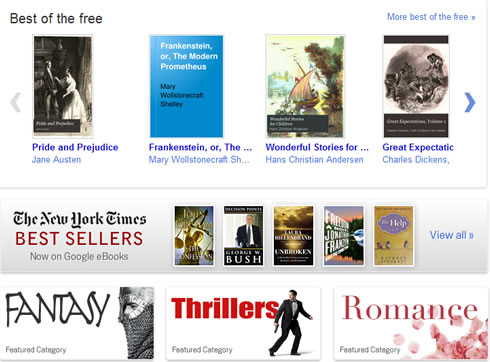Google eBooks Store Launches With Help From Adobe, Skipping Hardware In Favor of Apps
Google eBookstore officially launched today in the US, just in time to compete for holiday sales with Amazon, Barnes & Noble and other eBook sellers.

Unlike Amazon and Barnes & Noble, Google won’t rely on eReaders to drive book sales, going with apps for Android, the iPhone and iPad instead. Most of the books will offer day/night reading settings, font size selection, line spacing and font choice. {ZDNet} While the Kindle also has its own apps on those devices as well, Amazon has done everything it can to push the advantages of e-Ink over the glossy screens of tablets and mobile phones. In fact, the Kindle is one of the most notable exceptions to the 85 devices the Adobe Content Server 4-driven store supports (the Nook is supported). {Adobe Digital Publishing blog}
While the Kindle’s wi-fi only version is one of the least expensive at $139 (and best selling), the cost of an app is sure to be less than the cost of a new device – at least for those who already own a smartphone. Also, the fact that Google offers cloud storage means that readers can use multiple devices to start and stop reading, provided there’s wi-fi. How much of an advantage that offers is up for debate, but Android has provided legitimate competition to the iPhone’s single device model, so if that’s any indication Google distributed eBooks may not be a Kindle killer, but could be decent competition, and make user adoption easier.
Don’t expect that to cause any kind of price war though: aside from the roughly 2.8 million out of copyright books which are free, Google’s working with the top 6 US publishers, who have managed to keep pricing the same across devices. That’s usually $10-15. Major publishers will take 70% of that price – considered standard, while other publishers will get 52%. For self-published work, that may make Amazon’s Kindle only model more attractive. Smaller booksellers like Powell’s, Alibris and the American Booksellers Association have been brought on as partners though, which could help in bringing independent titles to the massive library.
Our take? New options in any field is rarely a bad thing. The Kindle is popular enough that it will probably continue to do well, but Google’s focus on distribution rather than device could make it a reasonable competitor.
